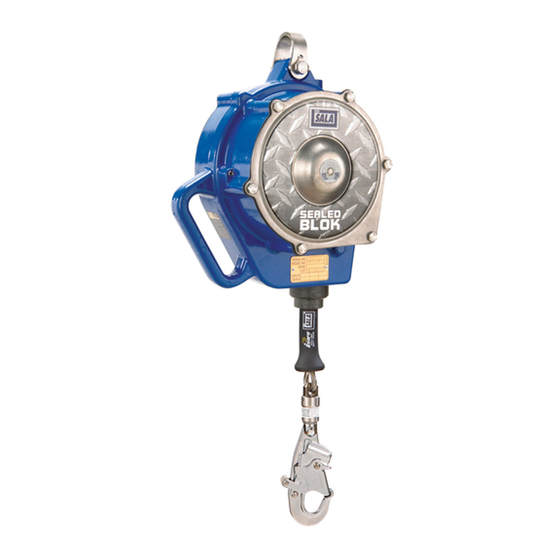DBI SALA Sealed-Blok 3400902C Manuel d'instruction de l'utilisateur - Page 4
Parcourez en ligne ou téléchargez le pdf Manuel d'instruction de l'utilisateur pour {nom_de_la_catégorie} DBI SALA Sealed-Blok 3400902C. DBI SALA Sealed-Blok 3400902C 17 pages. Self retracting lifelines

2.6
FREE FALL: When used correctly, SRLs will limit the free fall distance to 2 ft. or less per OSHA. To avoid increased
fall distances, do not work above the anchorage level. Avoid working where your lifeline may cross or tangle
with that of another worker. Do not allow the lifeline to pass under arms or between legs. Never clamp,
knot, or prevent the lifeline from retracting or being taut. Avoid slack line. Do not lengthen SRL by
connecting a lanyard or similar component without consulting Capital Safety.
2.7
FALL CLEARANCE: Ensure that adequate clearance exists in the fall path to prevent striking an object during
a fall. A minimum of 6 feet (1.8 m) from the working level to the lower level or nearest obstruction is
recommended.
2.8
SWING FALLS: Swing falls occur when the anchorage point is not directly above the point where a fall
occurs. See Figure 2. The force of striking an object in a swing fall may cause serious injury. In a swing
fall, the total vertical fall distance will be greater than if the user had fallen directly below the anchorage
point, thus increasing the total free fall distance and the area required to safely arrest the user. The SRL
will activate regardless of its orientation relative to the user. The recommended work zone represents the
typical acceptable work area for most applications. Review your specifi c application to determine what the
appropriate work zone should be. Minimize swing falls by working as directly below the anchorage point as
possible. Never permit a swing fall if injury could occur. If a swing fall situation exists in your application
contact Capital Safety before proceeding.
Swing Fall
Hazard
6 ft (1.8 m)
Minimum
EXAMPLE: If the worker is 40 ft (12 m) directly below the SRL, the recommended work zone is 18 ft (5.5 m) in any
direction.
2.9
HAZARDS: Use of this equipment in areas where surrounding hazards exist may require additional precautions to
reduce the possibility of injury to the user or damage to the equipment. Hazards may include, but are not limited
to: high heat, caustic chemicals, corrosive environments, high voltage power lines, explosive or toxic gases,
moving machinery, or sharp edges.
2.10 SHARP EDGES: Avoid working where the lifeline will be in contact with or abrade against unprotected sharp
edges. Provide protection for the lifeline when possible. An energy absorbing component can sometimes be
added in-line to further protect the worker. Compatibility and total fall distance must be considered if this is
done. Contact Capital Safety before using an in-line energy absorbing component or lanyard with an SRL.
2.11 BODY SUPPORT: A Full Body Harness must be used with the Sealed-Blok™ Self Retracting Lifeline. The harness
connection point must be above the user's center of gravity. A body belt is not authorized for use with the
Self Retracting Lifeline. If a fall occurs when using a body belt it may cause unintentional release and possible
suffocation because of improper body support. Substitutions of equipment or system components must not be
made without the written consent of Capital Safety.
netzerotools.com
netzerotools.com
Figure 2 - Fall Clearance and Swing Falls
Working
Level
Lower
Level
3
netzerotools.com
netzerotools.com
Working Distance from Anchorage
80 ft
(24 m)
70 ft
(21 m)
60 ft
(18 m)
50 ft
(15 m)
40 ft
(12 m)
30 ft
(9 m)
20 ft
(6 m)
10 ft
(3 m)
0
0
10 ft
20 ft
30 ft
(3 m)
(6 m)
(9 m)
D= Distance Person Can Move
(Horizontally)
40 ft
(12 m)
